This is an archived article that was published on sltrib.com in 2011, and information in the article may be outdated. It is provided only for personal research purposes and may not be reprinted.
The long-running shortage of restaurant liquor licenses may again plague entrepreneurs hoping to open an eatery next year.
In October, Utah's shortage of liquor licenses was so acute that 13 applicants were willing to pay a fee that nearly doubled their costs rather than risk missing out on one.
But on Tuesday, several business failures freed up more restaurant permits that allow eateries to serve all types of alcohol under the state-run liquor monopoly. Commissioners with the Utah Department of Alcoholic Beverage Control gave out several liquor licenses, but expect another shortage could occur by next spring.
No additional bar permits, which don't require patrons to order food with alcoholic beverages, became available. They have been nonexistent for more than a year. Eighteen applicants are on a waiting list.
Population estimates, which determine the number of available licenses, have been so skewed that the state must eliminate five bar permits before any more become available through population growth or business failures.
On Tuesday, however, four restaurants owners applied for 12 available permits to serve all types of alcohol, while 21 permits for beer and wine sales were available for two applicants.
Population miscounts also resulted in an over-allocation of restaurant permits . But lawmakers forgave the inflated figures — and also transformed 40 beer bar licenses to restaurant permits in July.
By coincidence or not, their actions benefitted the City Creek retail-residential-office development in downtown Salt Lake City that is bankrolled by The Church of Jesus Christ of Latter-day Saints. In August, permits were awarded to the Cheesecake Factory and the Texas de Brazil steakhouse, which are set to open next March in the City Creek Center shopping center.
Although Cheesecake Factory is known for large bar areas, bartenders in the City Creek location will have to mix drinks in back rooms to comply with a recently enacted Utah law that prohibits mixing alcohol in public view. Cheesecake Factory's other Utah location, in Fashion Place mall in Murray, is exempt because its bar was constructed before the law went into effect, in January 2010.
The law's passage was driven, in part, by some liquor-control commissioners and legislators who contend that bars in restaurants cloud the distinction between family-oriented eateries and liquor establishments. The Cheesecake Factory was one of several restaurants singled out for criticism.
Twitter@DawnHouseTrib —
Panel to address mismanagement of DABC
P Utah Democratic legislative leaders Sen. Ross Romero and Rep. David Litvack are soliciting public input before a panel of business leaders who will provide recommendations on addressing problems of mismanagement that have come to light in a series of audits of the Utah Department of Alcoholic Beverage Control. The panel will deliver recommendations to lawmakers at the start of the legislative session in January. The meetings are scheduled on the following dates:
Jan. 5, 6 to 7 p.m.• via Twitter. Log in and follow along with #DABCreview
Jan. 10, 2 to 4 p.m., • at Salt Lake City Library Main Branch, 4th floor conference room
Panel members • co-chair Peter S. Cooke, CEO of PSC Enterprises and major general, U.S, Army, retired; co-chair Jeff Hatch, former Salt Lake County auditor and former president and general manager of KUTV Channel 2; co-chair, Stephen Schubach, CEO of Standard Optical; Scott Evans, owner, Pago Restaurant; David Cole and Peter Erickson, cofounders, Epic Brewing Co.; Dave Sabey, founder, Moab Brewery; Brett Birt, vice president, Golden Beverage; Tamara Gibo, owner, Takashi Sushi restaurant; Kris Bodeen, co-owner, Tsunami restaurant; and Dave DeSeelhorst, CEO, Solitude Mountain Resort.



